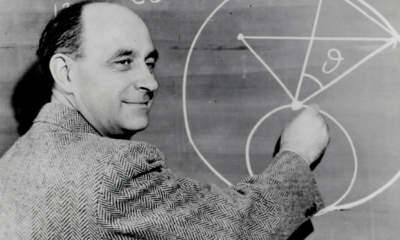Success Advice
The Top 10 Easy & Creative Ways That You Can Make A Million Dollars This Year

When they say there is a million and one different ways to make something work they aint wrong. If you really wanted to make millions and you have the time and patience to master the art of a new found passion of yours, you could be well and truly on your way to making you millions. iPhone Apps, Kindle Books, eBay stores and Twitter tweets are a just a few platforms out there that allow you to make serious doe.
Be resourceful like these guys here and you could be cashing in, in a new, fun and creative way.
The Top 10 Million Dollar Opportunities
Sell 714,286 Self-Published Books On A Kindle
Average cost of a book sold:$2
Profits you keep:70%
Million-dollar math: For every $2 book sold, you keep $1.40. $1.40 X 714,286 books = $1,000,000.40
Who did it: Earlier this year, 26-year old Amanda Hocking was the best-selling “indie” writer on the Kindle store. She was selling around 100,000 copies per month at $1 to $3 a pop which set her on track to pocket a few million dollars.
Sell 477,483 apps in the App Store
Average cost of an app:$2.26, but since Apple doesn’t let people sell apps for that amountwell round up to $2.99.
Profits you keep: 70%
Million-dollar math: For every $2.99 app sold, you keep $2.093. $2.093 X 477,784 apps = $1,000,001.91
Who did it: Doodle Jump’s Igor and Marko Pusenjak, Tap Tap Revenge and Peter Verterbacka of Rovio’s Angry Birds
Rent your car for 8,680 days (208,334 hours) on GetAround
What it is:GetAroundlets you rent your car to strangers for an hourly rate of your choosing. GetAround covers all insurance and other costs of operating the service, and renters are responsible for the gas they use.There are no expenses beyond GetAround’s 40% commission.
Average cost per hour: $8.00 per hour.
Profits you keep: 60%
Million-dollar math: For every hour, you keep $4.80. $4.80 X 208,334 hours = $1,000,003.20
Who did it: No one yet. Be the first.
Teach 5,082 Skillshare classes
What it is: Skillsharelets anyone teach a class on anything they’re good at. Teachers set the cost of the ticket, find a venue, and pick a day to host a class on a topic of their choosing. Skillshare takes 15% of all tickets sold and PayPal takes 3%.
Average cost per ticket: Tickets range from free to hundreds of dollars. According to a third-party source, the average ticket cost is $24 dollars. Classes have about 10 people in them. Teachers keep all cash aside from paying Skillshare 15% of the revenue and PayPal 3%, so they make around $196.80 per class.
Profits you keep: 82%
Million-dollar math: $196.80 X 5,082 classes = $1,000,137.60
Who did it: No one yet. Be the first.
Sell yourself 250,000 ways on Fiverr
What it is: Sell anything you can think of for $5 on Fiver. “Gigs” include “I will get you at least 800 Twitter followers within 7 days for $5” and “I will create a video of you producing a fireball using your own hand for $5”
Average cost per gig: Everything costs $5.
Profits you keep: 80%
Million-dollar math: For every $5 gig sold, you keep $4. $4 X 250,000* gigs = $1,000,000
Who did it: No one yet. Have a go at it.
Sell 10,262 business plans on eBay
Cost per business plan:$111 (£68.00)
Profits you keep:eBay charges a $0.50 insertion fee, 15.0% of the initial $50.00, plus 5.0% of the remaining final sale price balance which leaves you with $97.45 per business plan sold.
Million-dollar math: $97.45 X 10,262 business plans = $1,000,031.90
Who did it: Earlier this year, Samuel Katabaaz tried to sell 99,999 copies of his startup’s business plan for £68.00 each. The idea was to fund his startup without giving up any of the equity. It’s not clear how many items he actually sold.
Tweet 800,000 sponsored messages on MyLikes
What it is:Tweet out sponsored messages and get paid a few cents every time one of your followers clicks on the ad.
Average cost per click: Cost per click is different for every user based on a calculated MyLikes Engagement Score. The score is determined by the user’s activity on Twitter, Facebook and YouTube. Over time, the score changes based on how many clicks the user generates per sponsored tweet.MyLikes tells us for a person with a few thousand followers, the average earning per click is between $0.10-$0.25. If you have 100,000+ followers, you can earn up to $1 per click.
For the sake of this scenario, we’ll put the average CPC at $0.25.
Profits you keep: 100%
Million-dollar math: $0.25 X 4,000,000 clicks = $1,000,000. If 5 people click every sponsored tweet, you’re looking at 800,000 tweets.
Who did it: Some of MyLikes’ celebrity tweeters, like Snooki and Khloe Kardashian, have made $40,000 per month on MyLikes. At that rate, it wouldn’t take long to hit $1 million.
Complete 3,225,807 HITS on Mechanical Turk
What it is: Sign up to do freelance workat costs often below minimum wage.
Average cost per gig: In 2009, NYU professor Panagiotis Ipeirotis tracked all MTurk HITS (Human Intelligence Tasks) for two months and found the average value of HITS posted per day was $2,000. Most people, he estimated, use the site one day per week and earn about $20.
But most of the recent HITS we found only pay a few cents per completed task. Businessweek tried out the service for seven hours one day, completing about 15 jobs, and making just $0.63 per hour. That comes out to $0.31 cents per HIT. We’ll use $0.31 cents/HIT for our calculation.
Profits you keep: 90% — Amazon takes 10% commission of every final HIT payment with a minimum fee of half a cent.
Million-dollar math: $0.31 X 3,225,807 HITS = $1,000,000.17
Who did it: We hope no one. It sounds grueling.
Rent your apartment for 10,520 nights
What it is: Rent a room in your apartment to a stranger for an amount and length of your choosing.
Average cost per rental: Hosts can charge renters whatever rate they want per night. Costs depend a lot on the host’s location though. AirBNB has a rate recommendation widget based on the host’s location.
When we typed in “Private Bedroom in NYC” it recommended we charge $98 per night. Even though NYC rates are higher than many other cities, we’ll use the $98 estimate for our calculation.
Profits you keep: 97% of the total rent cost.
Million-dollar math: For every $98/night rental, you keep $95.06. $95.06 X 10,520 nights = $1,000,031.20
Who did it: If no one has done it yet, a few AirBNB users are well on their way. Daren from London says he has made $100,000 via AirBNB. Jeff from Paris says he’s made $90,000.
Cofounder Brian Chesky also decided to go homeless everyday for a few months, so he probably made some good money using his service during that time.
Sell 1,000,000 pixels on a webpage to advertisers
Cost per pixel:$1
Profits you keep:100%
Million-dollar math: $1 X 1,000,000 pixels = $1,000,000
Who did it: 21-year-old Alex Tew.
Article By BusinessInsider.com
Business
Why Smart Entrepreneurs Are Quietly Buying Gold and Silver
When stocks, property, and cash move together, smart business owners turn to one asset that plays by different rules.

You’ve built your business from the ground up. You know what it takes to create value, manage risk, and grow wealth. But here’s something that might surprise you: some of the most successful entrepreneurs are quietly adding physical gold and silver to their portfolios. (more…)
Business
The Simple Security Stack Every Online Business Needs
Most small businesses are exposed online without realising it. This simple protection stack keeps costs low and risks lower.

Running a business online brings speed and reach, but it also brings risk. Data moves fast. Payments travel across borders. Teams log in from homes, cafés, and airports. (more…)
Business
If Your Business Internet Keeps Letting You Down, Read This
From smoother operations to better security, dedicated internet access is quietly powering today’s high-performing businesses.

Today, a dependable internet service is the bedrock for uninterrupted business operations. Many organizations rely on stable online connections for communication, data transfer, and customer interaction. (more…)
Did You Know
How Skilled Migrants Are Building Successful Careers After Moving Countries
Behind every successful skilled migrant career is a mix of resilience, strategy, and navigating systems built for locals.

Moving to a new country for work is exciting, but it can also be unnerving. Skilled migrants leave behind familiar systems, networks, and support to pursue better job opportunities and a better future for their families. (more…)
-

 News3 weeks ago
News3 weeks agoBrandon Willington Builds 7-Figure Business by Ignoring Almost Everything
-

 Health & Fitness3 weeks ago
Health & Fitness3 weeks agoWhat Minimalism Actually Means for Your Wellness Choices
-

 Did You Know3 weeks ago
Did You Know3 weeks agoWhy Most Online Courses Fail and How to Fix Them
-

 Business3 weeks ago
Business3 weeks agoIf Your Business Internet Keeps Letting You Down, Read This
-

 Business2 weeks ago
Business2 weeks agoEntrepreneur’s Guide to Pay Stubs: Why Freelancers and Small Business Owners Need a Smart Generator
-

 Business1 week ago
Business1 week agoThe Salary Shift Giving UK Employers An Unexpected Edge
-

 Business2 weeks ago
Business2 weeks agoThe Simple Security Stack Every Online Business Needs
-

 Scale Your Business2 weeks ago
Scale Your Business2 weeks ago5 Real Ways to Grow Your User Base Fast


























6 Comments